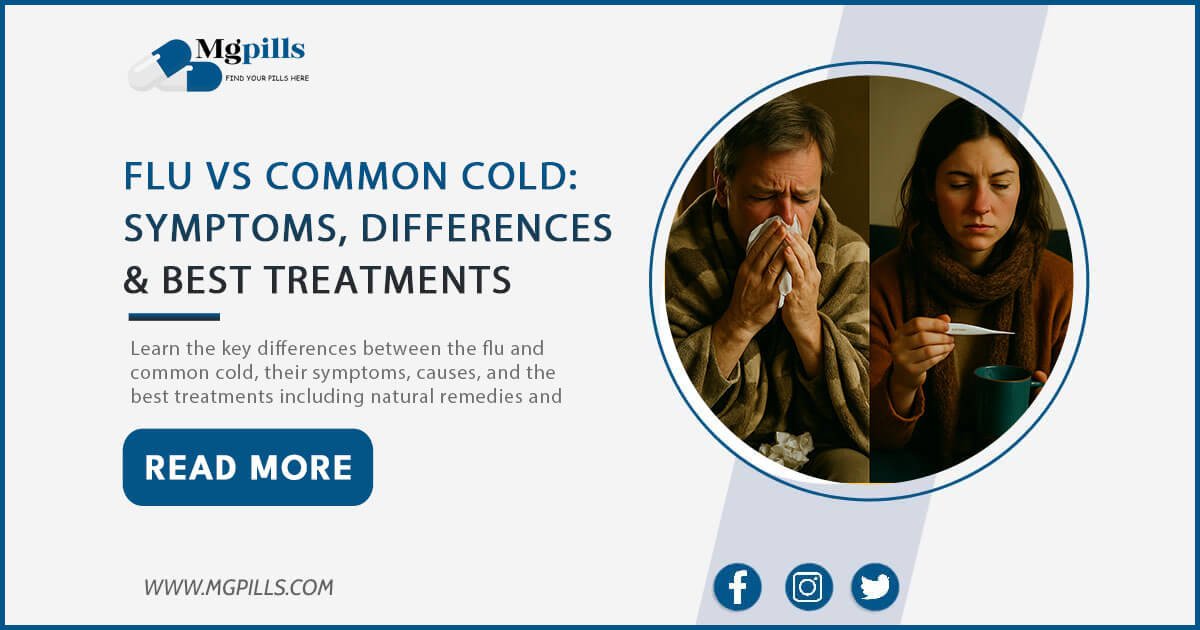Flu vs Common Cold: Symptoms, Differences & Best Treatments

Every year, millions of people fall ill with respiratory infections—most commonly the flu and the common cold. While these two illnesses share similar symptoms, they are quite different in terms of cause, severity, and treatment. Understanding the differences can help you get the right treatment, avoid complications, and recover faster.
What Is the Common Cold?
The common cold is a mild viral infection of the upper respiratory tract. It’s typically caused by a group of viruses, most notably rhinoviruses. It spreads through airborne droplets, surface contact, or direct personal interaction.
Common Cold Symptoms
- Runny or stuffy nose
- Sneezing
- Mild cough
- Sore throat
- Fatigue (mild)
- Watery eyes
These symptoms usually appear gradually and last for 3 to 7 days, though some can linger longer.
What Is the Flu (Influenza)?
The flu is a contagious respiratory illness caused by influenza A or B viruses. It tends to spread rapidly during colder months and can be more severe than the common cold.
Flu Symptoms
- High fever (often above 100°F or 38°C)
- Chills and sweating
- Headache
- Dry, persistent cough
- Muscle or body aches
- Fatigue (moderate to severe)
- Sudden onset of symptoms
The flu can last up to 2 weeks and may lead to serious complications, especially in children, elderly people, or those with weak immune systems.
Flu vs Common Cold: Key Differences
| Feature | Common Cold | Flu |
|---|---|---|
| Onset | Gradual | Sudden |
| Fever | Rare | Common and high |
| Fatigue | Mild | Severe |
| Body Aches | Slight | Common and intense |
| Cough | Mild to moderate | Often severe |
| Headache | Rare | Very common |
| Duration | 3–7 days | 7–14 days |
Diagnosis: How to Know Which One You Have
Cold Diagnosis
Most colds don’t require medical attention. Diagnosis is usually made based on symptoms alone.
Flu Diagnosis
Doctors may use:
- Rapid Influenza Diagnostic Tests (RIDTs)
- Nasal or throat swabs for lab analysis
Getting a proper diagnosis is important if your symptoms are severe or you’re in a high-risk group.
Best Treatments for Flu and Common Cold
🟢 Treating the Common Cold
There is no cure for the common cold, but symptoms can be managed:
- Rest and stay hydrated
- Steam inhalation for congestion
- Over-the-counter decongestants
- Paracetamol or ibuprofen for fever and pain
- Throat lozenges and warm fluids
💡 Antibiotics are ineffective against colds as they are caused by viruses.
🔴 Treating the Flu
If diagnosed early (within 48 hours of symptom onset), antiviral medication can help reduce severity and duration.
✅ Recommended Medication: Antiflu 75 mg
- Contains Oseltamivir, a powerful antiviral
- Shortens flu duration
- Reduces complications
Other flu treatments include:
- Rest and fluids
- Fever reducers (paracetamol)
- Avoiding strenuous activity
- Isolating to prevent spreading
Natural & Home Remedies
Some people prefer to complement treatment with natural methods, especially for mild cases:
🌿 For Cold & Flu:
- Ginger tea & honey – Soothes throat and cough
- Garlic – Boosts immunity
- Vitamin C & Zinc – May reduce duration
- Warm chicken soup – Provides comfort and nutrition
- Salt water gargles – Helps with sore throat
Prevention: Stay Ahead of Infections
✔️ General Prevention Tips:
- Wash your hands often with soap
- Avoid touching your face
- Clean frequently-touched surfaces
- Avoid close contact with sick individuals
- Wear a mask in crowded areas during flu season
💉 Get Vaccinated (Flu Only)
- Annual flu shots reduce your risk significantly
- Especially recommended for: seniors, children, pregnant women, and people with chronic illnesses
When to See a Doctor
Don’t ignore warning signs. Seek medical attention if you experience:
- Fever above 102°F for more than 3 days
- Chest pain or pressure
- Trouble breathing or wheezing
- Confusion or disorientation
- Persistent vomiting or diarrhea
- Bluish lips or nails
FAQs
❓ Can the flu turn into pneumonia?
Yes, especially in people with weak immune systems or pre-existing conditions.
❓ Is Antiflu 75 mg safe for everyone?
Antiflu is generally safe but should be taken under medical supervision—especially if pregnant, nursing, or having kidney issues.
❓ Can I take antibiotics for a cold or flu?
No, antibiotics don’t work against viruses. They’re only for bacterial infections.
❓ What’s the best way to speed up recovery?
Rest, hydration, and antiviral meds (for flu) are key. Don’t rush back to work or activity.
❓ Can I get the flu twice in one season?
Yes, if you’re exposed to different strains of the flu virus.
🔚 Conclusion
Although the common cold and flu may seem similar, they are quite different in terms of symptoms, severity, and treatment. While the common cold is generally mild and self-limiting, the flu can be serious and may require antiviral medications like Antiflu 75 mg for effective recovery.
Understanding the differences, recognizing symptoms early, and knowing when to seek help can make all the difference in how quickly you recover and prevent complications.


Awesome! Its genuinely remarkable post, I have got much clear idea regarding from this post
This is really interesting, You’re a very skilled blogger. I’ve joined your feed and look forward to seeking more of your magnificent post. Also, I’ve shared your site in my social networks!